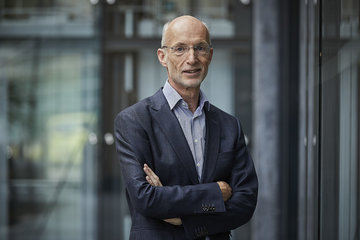EcoBus is picking up speed
The newly founded company EcoBus GmbH is developing software infrastructure that combines shuttle services and regular bus services to provide a sustainable public transport solution
Transporting people more efficiently and in a more environmentally friendly way – this is the goal of EcoBus GmbH. The newly founded company wants to achieve this goal by cleverly bundling journey requests from individual passengers. The basis for this is provided by software that combines small shuttle buses with existing regular bus services to form an overall system – and offers passengers a door-to-door service for the cost of a local public transport ticket. Ecobus offers its services to all mobility providers and, in addition to allowing users to book trips throughout the local region, also intends to enable longer journeys in the future. The software, which was developed at the Max Planck Institute for Dynamics and Self-Organization in Göttingen, Germany, in collaboration with local public transport stakeholders, is now being brought to market maturity and marketed by the spin-off company.

With the founding of EcoBus GmbH the idea of integrating ride pooling services into local public transport continues to gain momentum. The project first came to light back in 2018, when customers in Bad Gandersheim and the Harz mountains were given the opportunity to experience individualized mobility services through EcoBus, which at that time was part of a research project at the Max Planck Institute for Dynamics and Self-Organization in Göttingen funded by the State of Lower Saxony and the EU. The passengers were picked up from their homes in minibuses and taken to their desired destination. When using the service, customers typically only see the booking app via which they submit their transport request to the system. The algorithm developed at the Max Planck Institute for Dynamics and Self-Organization assigns the passenger to a vehicle and optimizes its route. The calculated route is then displayed to the driver in real time on the navigation system, along with information about each passenger's pick-up and drop-off point. This means that the route may change during the journey if further bookings are made. In the future, a payment function will also be integrated to allow all service providers involved to be paid via a single booking per customer.
Experience has shown that passengers don't mind the fact that the most direct route is not necessarily taken on each journey, and that instead minor detours are made to drop off and collect other people. To use the service, passengers only pay for a standard public transport ticket, which costs significantly less than a taxi, yet guarantees a comparable level of convenience. In 2019 the project was awarded the Environment Prize by the State of Lower Saxony.
Combining scheduled services and shuttles
Initially, the new transport system found itself in direct competition with the regular public transport services – for this reason it was not possible to embed it as a permanent service. In the meantime, the team at the Max Planck Institute for Dynamics and Self-Organization has refined the concept to ensure that it does not duplicate existing services. Instead, the new software combines regular services and shuttles into an overall intermodal system that brings passengers from door to door for the price of a local public transport ticket. This not only provides a high level of convenience, but also boosts the regular bus services. A pilot project offering this improved system has been running successfully for about a year in a suburban area of Leipzig. Thanks to the system's intermodal integration, the minibuses only need to cover the last few miles between the regular bus stop and the passengers' front doors.
"This is a win-win situation. Customers enjoy the door-to-door service and the regular services are being better utilized because more customers are using each route," says Lorenz Hartung, managing director of the new company. "Moving forward, we will offer our service to all mobility service providers, not only in Germany, but also worldwide in the medium term. The goal is to provide a service that will enable customers to book both a trip from Bovenden to Friedand and, for example, a trip from Göttingen to New York using just one transport system."
A new business model for ride pooling
EcoBus GmbH can now make the software, which was developed at the Max Planck Institute for Dynamics and Self-Organization in collaboration with the stakeholders responsible for the organization and financing of local public transport, commercially viable and market it. The founding of EcoBus GmbH has been supported from the outset by Max Planck Innovation, the technology transfer organization of the Max Planck Society. It rendered assistance during the preparatory phase by, among other things, providing an interim manager who focused on establishing the company and now takes over the management. In addition, Max Planck Innovation helped to create a business model that is a world-first in the field of ride pooling. While the existing providers primarily rely on squeezing out the competition, thanks to its inclusive concept EcoBus GmbH is careful to use the existing structures and create synergies. "The digitization of local and long-distance public transport plays an important role in unburdening traffic infrastructure and reducing CO2 emissions. The service offered by EcoBus GmbH significantly increases the efficiency of passenger transport and at the same time makes it more convenient for users," says Dieter Treichel, Start-Up & Portfolio Manager at Max Planck Innovation.












